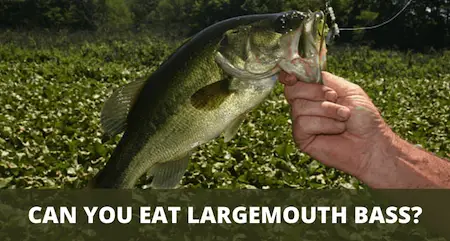Are Largemouth Bass Good To Eat?
UPDATED 03 NOVEMBER 2023
by Robert Ceran
Largemouth bass is the most popular game fish species for anglers in the USA, and every year millions of Americans go bass fishing.
But in spite of the popularity of bass fishing, hardly anyone seems to eat them.
This raises the question: can you cook and eat bass, and if yes, why don’t anglers eat them more often?

Here’s the quick answer:
Yes, you can absolutely eat largemouth bass, but they’re generally not regarded as one of the more tasty freshwater fish. Salmon, trout, walleye, and others are much more popular in terms of taste.
In addition, bass from stagnant ponds or rivers can have a muddy flavor that puts many people off. Overall, most anglers tend to agree that bass are a lot more fun to catch than they are to eat.
Can you eat largemouth bass?
If you’re like me and like to catch bass, you’ve probably asked yourself many times if they are any good to eat?
And if you’ve been around bass anglers at all, you probably noticed that most of them release their fish after catching, and almost none keep any for eating.
So why is this?
One option could be that eating largemouth bass isn’t good for you, but that’s definitely not the case. They are absolutely fine for human consumption, and some people eat bass regularly.
Another reason could be that they don’t taste good. And while taste is a very subjective and personal matter, there is more support for this argument.
Especially bass that have been caught in stagnant waters often have a muddy flavor, which is very hard to disguise with even the best of recipes.
If you’re planning to eat bass, make sure they come from clean waters, ideally large, clear lakes or rivers that aren’t polluted. Don’t eat a bass caught in a murky pond, or the drainage canal.
As a general rule of thumb, the taste of largemouth bass is similar to the smell of the water they were caught in.
So if they come from a lake in a swampy area with a ‘tangy’ smell, their taste will be similar, and in that case they’re not really good to eat. Ideally, the water they come from should be clear and odorless.
Also keep in mind that many lakes tend to have cleaner water during the cold season, due to algal bloom in summer. If that’s the case for your lake, it’s best to eat bass only early or late in the season, but not during summer.
And in any case it’s always a good idea to find out what the level of pollution is in the waters that you fish – that goes for all fish species before you decide to eat them.
What does largemouth bass taste like?
Are you wondering, what does bass taste like? The answer depends on where you get it from. If you manage to get largemouth bass from a clean lake, they have a mild and agreeable flavor, somewhat like bluegill. When prepared correctly, their flesh is white and tender, and becomes flaky when fully cooked.
However, if you get bass from murky or unclean waters, they can taste terrible. For example, during the algal bloom in summer, bass meat tends to have a muddy flavor, which is why it’s better to eat largemouth bass during the colder months.
Another reason why some people don’t like eating bass is because gutting them results in an unpleasant and pungent smell from their body cavity.
Fortunately, you can get rid of the smell with thorough rinsing, and after cooking there is usually no trace left of it.
Personally, I’ve had some bass that tasted fine, and some that tasted terrible, so there does not seem to be a single answer to this question.
I think a lot of it comes down to where the bass are from, as well as their size and the skill of the cook who prepares them.
What size bass should you eat?
The best size largemouth bass to eat is about 10-14 inches, and ideally no bigger than 15 inches.
Similar to many other fish species, younger bass have more tender meat and better flavor, while the older ones get tougher, and tend to accumulate more toxins over the years.
In addition, it’s also easier to cook the small ones. If you’ve ever tried to cook a big fish, there is usually always a part of the meat that’s not fully cooked, while the parts at the edge are already more than done.
How to cook largemouth bass
The best way to cook largemouth bass is by fileting them, followed by one of the following methods of cooking:
- Pan frying
- Deep frying
- Grilling
- Baking
First cut off the filets and pull off the skin. The firm white filets are perfect for covering with a milk, flour and breadcrumb batter, followed by pan frying them.
Or you can cut the bass filet into smaller nugget sized pieces before battering them, followed by deep frying.
Another delicious way to cook largemouth bass is by baking it in alufoil. Just add some seasoning, crushed garlic and lemon juice, and then let them stew in their own juice until the meat starts to flake.
Is it better to release largemouth bass, or to eat them?
Many anglers practice a catch and release philosophy when it comes to bass fishing, sometimes to the extent that it has almost become a religion.
For those anglers it’s practically a sacrilege to cook and eat bass. From a conservation standpoint, the philosophy of catch and release does make a lot of sense.
Due to their popularity as game fish, largemouth bass get more fishing pressure than any other fish species in the USA, and if most anglers would kill the bass they catch, this would impact their populations significantly.
However, if you don’t take home every single bass you catch, but only a few of the smaller ones, that shouldn’t be a problem at all.
Putting back the big ones is the right thing to do for several reasons anyways. Firstly, they tend to be big female breeders that produce thousands of eggs every spawning season, and secondly, they also taste a lot worse than the smaller ones.
But given that there are lots of other fish species that taste better than bass, including crappie, perch, trout, and walleye, I would suggest that it’s not really necessary to take bass home.
Even anglers who like eating bass tend to agree that their flavor is nothing special. In that case, why not release them, and keep the more delicious species for eating?
By the way, another reason to keep a bass is if it’s your personal best, and you want to mount it. If this is the case, then check out our article on how to mount a fish.
Final remarks
In summary, largemouth bass is completely fine to eat, and can make a tasty dish when it comes from a clean environment and is prepared with a good recipe.
But you should definitely make an effort to avoid bass from stagnant or unclean waters, as they tend to taste terrible.
